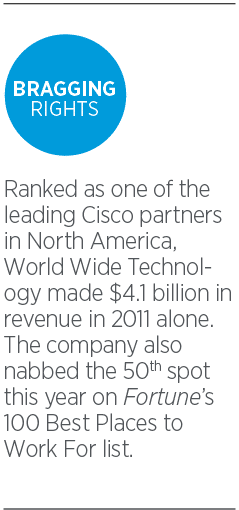In just 20 years, Jim Kavanaugh, cofounder and CEO of World Wide Technology (WWT), has transformed a small start-up into a leading supplier of advanced technology solutions and one of the largest privately held companies in St. Louis. With $4.1 billion in revenue in 2011 and 25 percent growth over the last three years, WWT offers products from more than 3,000 manufacturers around the world coupled with end-to-end supply-chain services. As one of the driving forces behind WWT’s growth, leadership, and core value system, Kavanaugh explains how the company was established, key strategies behind its growth, and what he thinks is the most important factor in managing a business.
After college, I played professional soccer and worked in electronic components for a company based in Montreal. I wanted to be in the IT systems business. I felt that was a growing market with expanding opportunities. So, I went from working with component-level electronic chips into the systems side, and that was the genesis of World Wide Technology. My business partner, Dave Steward, and I started the company when we were both fairly inexperienced in IT by reselling computer systems and printers back in 1990.
 Today, WWT is an information-technology systems integrator. Our goal is to provide discrete components of technology and build them into integrated business solutions for our customers. We provide our commercial and federal customers with an array of security technologies, cloud infrastructure, data center and networking capabilities, as well as mobility, voice, video, and collaboration solutions.
Today, WWT is an information-technology systems integrator. Our goal is to provide discrete components of technology and build them into integrated business solutions for our customers. We provide our commercial and federal customers with an array of security technologies, cloud infrastructure, data center and networking capabilities, as well as mobility, voice, video, and collaboration solutions.
We have six major partners. Our top partner is Cisco, with almost $2 billion in sales. Other strategic partners include EMC, HP, NetApp, Citrix, and VMware. We build our solutions around our partners’ technology and integrate products from multiple vendors together to meet the individualized needs of our clients. We serve the commercial market, the federal government and public sector, along with service providers like AT&T and Verizon.
Different challenges arise as you build and develop a company. For about the first five years, we focused day in and day out on how to financially manage the cash flow of the business. At that early stage, we knew if we didn’t close enough business and manage the numbers correctly, we could go out of business very quickly. You have to capture business, gain enough traction with customers and weather the storm with your cash flow to eventually grow and build a more sustainable business.
In this fast-paced IT world, a never-ending challenge and opportunity is that the market changes based on how new technology is introduced into the global environment. If you’re unable to anticipate some of the changes and inflection points in the market, or if you focus on the wrong trends, you’re out of business. Our winning strategy has involved aligning with the right partners, being as insightful as possible, and picking the right technology solutions.
The number-one thing that makes us stand out from competitors is our culture. If your internal teams speak very positively about what’s going on, how they’re treated, their opportunities to grow, and they feel part of a winning team, that culture is such a powerful and positive thing. As our partners interact with our employees, they see and feel that we have a culture where people like to work and where employees like to support our customers and partners. We have always focused on taking care of our employees, and in turn, they take care of our customers and partners.
We’re very bullish on growth. If you look at World Wide in 2011, we hired approximately 335 employees. In 2012, we plan to hire about 450 people. We’ve seen a lot of continued growth domestically and globally. Of course, many challenges remain: Political uncertainty, financial issues with different countries, and a lot of uncertainty in the overall general economy and marketplace, but we have grown significantly. Over the last three years, we have seen 25 percent growth and our head count is still growing.
Core values are absolutely critical to World Wide. Twelve years ago, I handwrote our core values and it took me six months. I wanted to make them simple, but also as meaningful. Ever since putting those in place, employees have been measured not only on job performance, such as sales executives hitting their sales numbers and targeted net contribution numbers, but also, on how they are performing relative to our core values. Is the employee embracing change? Are they team players? These contributions are just as important as quantitative measures. We hold everyone in the company responsible for performing on the behavioral side and on [the] specific job-performance side.

